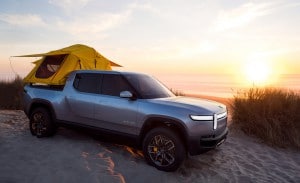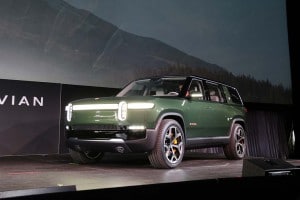
Like Tesla, Rivian is a ground-up automaker looking to produce and sell electric vehicles. Like Tesla, it plans to sell their battery-electric truck and ute directly to customers.
And that means, like Tesla, they’re going to need some states to change or make exceptions to existing laws requiring auto companies to sell their vehicles using a dealer network. The Detroit-based EV maker just started that process in Colorado.
Lobbying state lawmakers, according to Automotive News, new legislation was introduced that would exempt electric vehicle makers from dealer-franchise law. An amendment was placed on the bill to prevent traditional automakers from selling direct to consumers.
(Rivian’s new electric truck is like a tank — when turning.)

Until now, Colorado had only allowed Tesla to sell directly to buyers in the state. The California-based EV maker now has four stores. Rivian is likely to have an easier time of it since Tesla has laid the groundwork in many states, especially in Colorado.
“I am of the opinion that we should have that option available to any EV manufacturer,” Chris Hansen, a Denver Democrat who cosponsored the bill, told the Colorado Sun. “Right now, Tesla has that ability, and I don’t see any reason why there shouldn’t be market access for any other manufacturer.”
Hansen and his legislative colleagues appear to be onboard, but as was the case when Tesla did it, dealer organizations are ready to put up a fight and the Colorado Automobile Dealers Association is doing just that.
(Lincoln turns to Rivian for help launching its first BEV.)
The organization claims the bill, if passed, would open the door to direct sales by any automaker that happens to sell an EV. Perhaps even more surprising is its additional premise: existing state law already allows manufacturers to operate their own dealerships if they don’t already have any dealers selling their products in the state.
In the meantime, Rivian’s been busy marshalling support for the proposed law as well as its R1T and R1S around the state. Though it looks promising in Colorado, and it’s already been a granted dealer license in Arizona, the company’s efforts in Washington look to be dead. It’s also seeking similar exemptions in Illinois, Massachusetts, California and Florida.
Ironically, it’s not licensed in its “home” state of Michigan. In fact, technically neither is Tesla, although after being stonewalled by a Republican-led effort from the previous administration, the newly elected Democratic administration have loosened up the restrictions.
(Tesla reaches deal to sell, service vehicles in Michigan.)
Under terms of the deal, Tesla would be allowed to deliver vehicles in Michigan so long as they are first titled outside the state. A Michigan owner could then get the title switched to Michigan.







